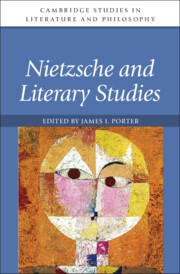Book contents
- Nietzsche and Literary Studies
- Cambridge Studies in Literature and Philosophy
- Nietzsche and Literary Studies
- Copyright page
- Contents
- Contributors
- Abbreviations
- Introduction
- 1 Heraclitus’ Clarity
- 2 Ariadne, or the Mediation of the Image
- 3 Nietzsche’s Centaurs
- 4 Nietzsche on the Task of the Poets in His Middle Writings
- 5 Some Images in Nietzsche’s Zarathustra
- 6 Nietzsche Ludens
- 7 Nietzsche and French Literature from the End of the Nineteenth Century to 1914
- 8 Ecce Mann
- 9 Plant Imaginaries and Human Existence in Nietzsche and Sartre
- 10 The Resources of the Figure
- 11 Nietzsche and Jewish Survival between Sarah Kofman and Jacques Derrida
- Editions and Translations of Nietzsche’s Works
- References
- Index
11 - Nietzsche and Jewish Survival between Sarah Kofman and Jacques Derrida
Published online by Cambridge University Press: 03 May 2024
- Nietzsche and Literary Studies
- Cambridge Studies in Literature and Philosophy
- Nietzsche and Literary Studies
- Copyright page
- Contents
- Contributors
- Abbreviations
- Introduction
- 1 Heraclitus’ Clarity
- 2 Ariadne, or the Mediation of the Image
- 3 Nietzsche’s Centaurs
- 4 Nietzsche on the Task of the Poets in His Middle Writings
- 5 Some Images in Nietzsche’s Zarathustra
- 6 Nietzsche Ludens
- 7 Nietzsche and French Literature from the End of the Nineteenth Century to 1914
- 8 Ecce Mann
- 9 Plant Imaginaries and Human Existence in Nietzsche and Sartre
- 10 The Resources of the Figure
- 11 Nietzsche and Jewish Survival between Sarah Kofman and Jacques Derrida
- Editions and Translations of Nietzsche’s Works
- References
- Index
Summary
Sarah Kofman has been equally credited with opening the question of what it means to read Nietzsche as a Jew through her work Les mépris des Juifs (1994) and with opening the pathway to a purely literary or rhetorical reading of Nietzsche in her 1983 work Nietzsche et la métaphore (Alan Schrift, “Les Mépris des Anti-Sémites: Nietzsche, Kofman and the Jews,” New Nietzsche Studies 7.34 (2007/2008) and Alexander Nehamas, Nietzsche: Life As Literature (Cambridge, MA: Harvard University Press, 1987) 15–17). It is the convergence of these two issues which will concern me in this chapter, not only in Sarah Kofman’s work but in the larger context in which she worked as a French, Jewish, female philosopher. Without providing an exhaustive study of the French Jewish reception of Nietzsche, I assume as a starting point that given the dominance of Nietzsche in the postwar French philosophical scene and the role that Nietzsche’s writings played in the development of Nazi ideology, the question of his ties to anti-Semitism could not have been irrelevant for postwar Jewish philosophers. While Kofman will remain at the center of the chapter, I will read her connection to these issues by juxtaposing them to Jacques Derrida’s and Emmanuel Levinas’s.
Levinas was perhaps the first French philosopher to consider the influence of Nietzsche on Nazi ideology in his 1934 essay “Quelques réflexions sur la philosophie de l’hitlérisme.” Nonetheless, Nietzsche will never play the role of foil for Levinas in the way Heidegger does. He continues to be a reference point for Levinas, but never an avowed resource. Like Kofman, Levinas associates Nietzsche with literature as Nietzsche’s depiction of the Dionysian power of rhythm becomes the dominant means by which Levinas himself characterize both literary and visual arts. For Levinas, however, the Nietzschean valorization of literature will provide a point of contrast to his portrayal of a Jewish ethics.
For Jacques Derrida, Nietzsche is a crucial reference point from his earliest writing. Some of these readings take place within the context of a burgeoning conversation with Emmanuel Levinas, while others develop in conversation with Kofman. Here I will compare Derrida’s earliest reflections on Nietzsche, in which Nietzsche serves as a counterpoint to Levinas to his later readings in Spurs and Otobiographes when Kofman was one of Derrida’s under-acknowledged interlocutors.
I will consider as well Kofman’s distance from Levinas despite a shared set of concerns and the role her views on Nietzsche and literature played in creating that distance. I will show finally how Kofman’s championing of Nietzsche’s strategic and rhetorical style allow her to rescue him as something of a hero, despite anti-Judaic comments dispersed through his corpus, in contrast to Levinas, whose disparagement of literature forecloses the possibility that Nietzsche could serve as a resource for him. For both Kofman and Derrida, I will show, Nietzsche in fact becomes a resource for the development of a “Janus-faced” (Kofman) or aporetic (Derrida) trope of the Jew.
- Type
- Chapter
- Information
- Nietzsche and Literary Studies , pp. 250 - 269Publisher: Cambridge University PressPrint publication year: 2024

